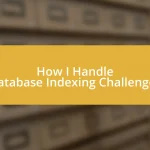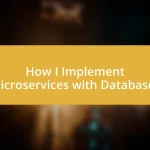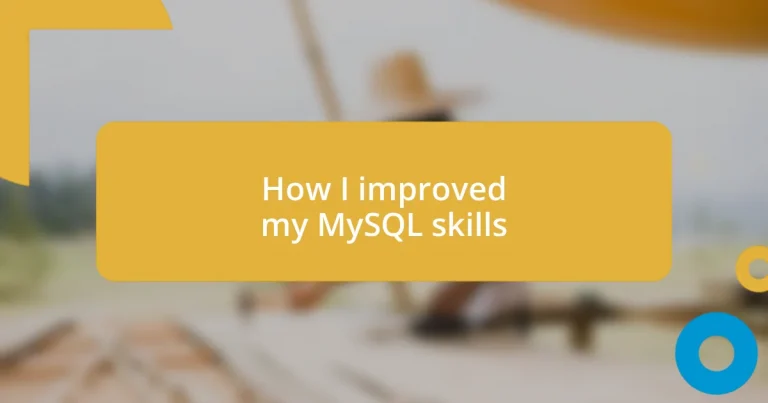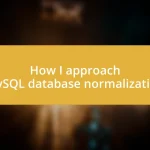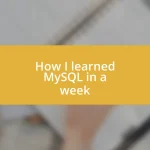Key takeaways:
- Setting clear learning goals, such as mastering normalization techniques and performance optimization, significantly enhanced the author’s MySQL skills and confidence.
- Engaging with hands-on projects and participating in community forums provided practical experience and valuable insights, fostering a supportive learning environment.
- Maintaining a practice schedule and reflecting on progress helped the author track growth and stay motivated on their journey towards advanced MySQL skills.
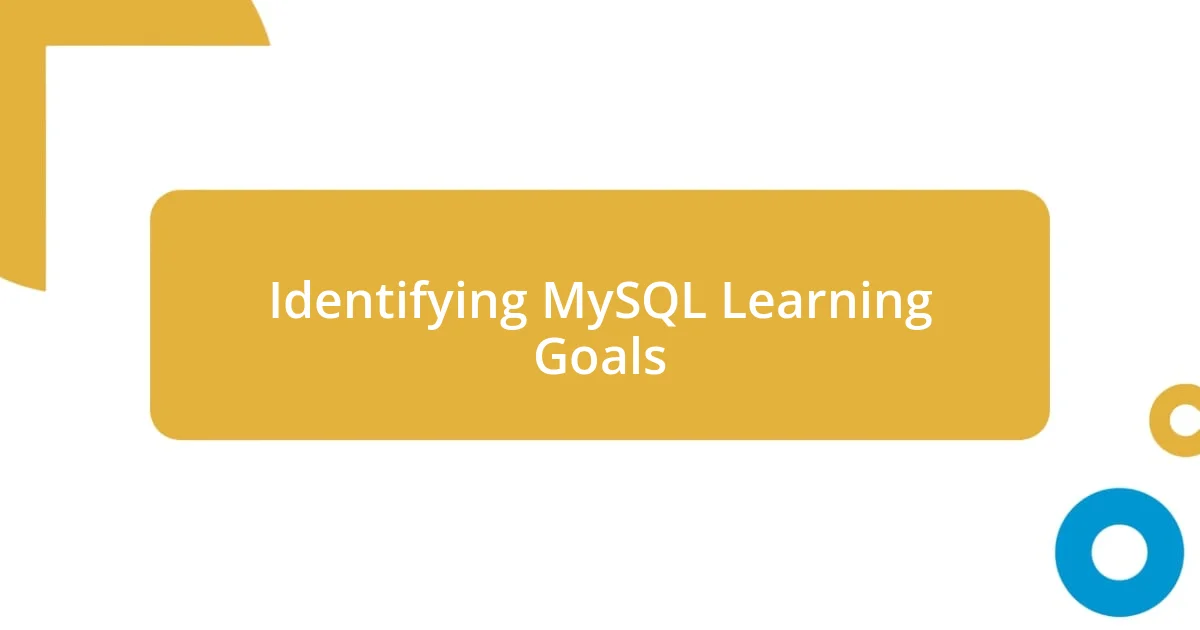
Identifying MySQL Learning Goals
When I first dived into MySQL, I realized that setting clear learning goals was essential. Initially, I aimed to understand basic queries, but as I progressed, I felt driven to master complex joins and subqueries. Who wouldn’t want to sift through mountains of data with ease, right?
I remember a moment when I was struggling with database design. It was frustrating, and I felt overwhelmed. That’s when I decided to prioritize my learning goal: understanding normalization techniques. By breaking down the concepts into manageable chunks, I found that not only did my skills improve, but my confidence soared.
For me, identifying specific goals, like performance optimization or indexing strategies, transformed my approach. I often ask myself how each new skill will benefit my projects. It’s that alignment between my goals and real-world applications that keeps me motivated to learn.
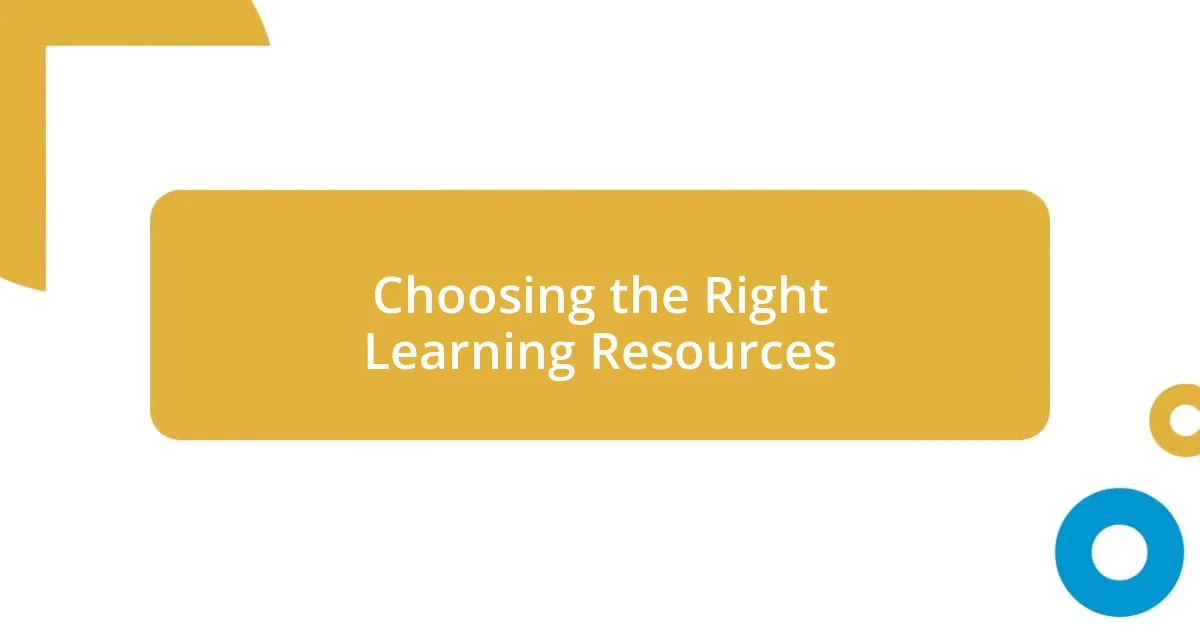
Choosing the Right Learning Resources
Choosing the right resources to learn MySQL can profoundly affect your progress. I remember spending countless hours sifting through online tutorials that just didn’t resonate with my learning style. It wasn’t until I discovered a well-structured course by a seasoned instructor that things began to click for me. It was incredible how using the right materials made complex concepts seem approachable.
When evaluating resources, consider both depth and breadth. Some tutorials might focus on just the basics, while others dive deep into advanced topics like stored procedures or transactions. I often found that hands-on resources, such as interactive coding platforms, offered a great balance. They allowed me to practice what I learned in real-time, reinforcing my understanding.
I also think it’s crucial to pay attention to the community around your chosen resource. Engaging with forums or discussion groups enhances the learning experience. I fondly recall my early days in a MySQL community, where members willingly shared their insights and helped solve problems I faced. It made me feel connected and supported in my learning journey.
| Resource Type | Pros |
|---|---|
| Online Courses | Structured learning, expert guidance |
| Books | In-depth knowledge, reference material |
| Interactive Tutorials | Hands-on practice, immediate feedback |
| Forums/Communities | Peer support, real-world problem solving |
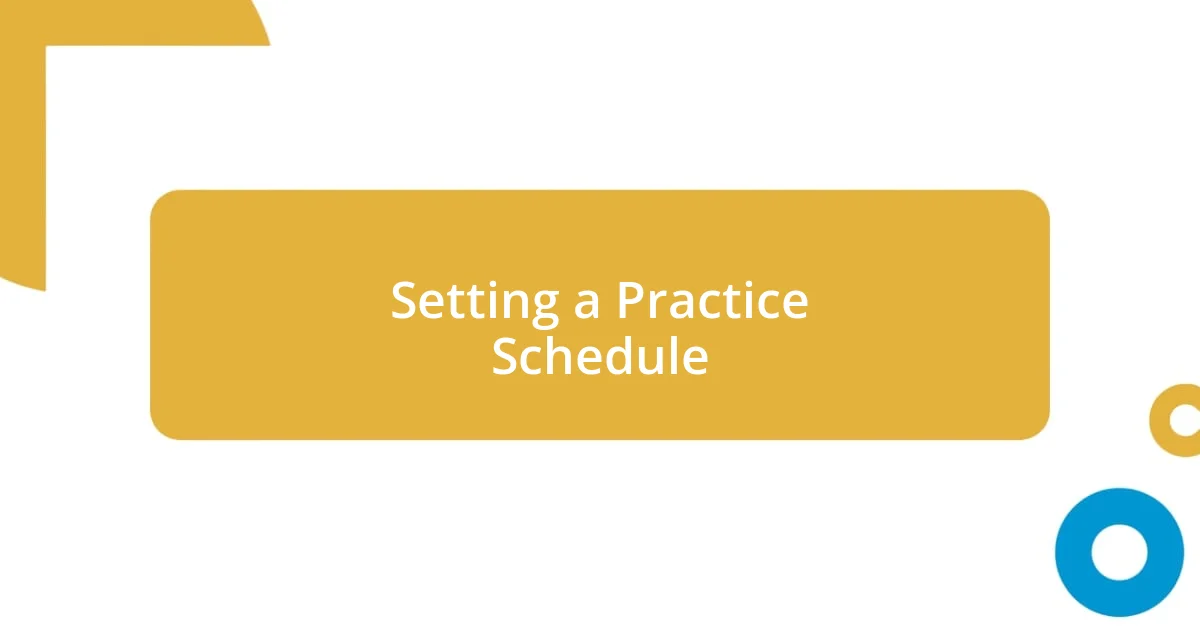
Setting a Practice Schedule
Setting a dedicated practice schedule is one of the most effective strategies I implemented to enhance my MySQL skills. I found that carving out specific times each week for focused practice made all the difference. Initially, I struggled with consistency; life always seemed to throw distractions my way. However, once I committed to my practice routine, I noticed remarkable improvement. It’s like the moment I turned on my computer with the intention to learn, my motivation kicked in.
To make my practice more effective, I developed a structured schedule that included the following elements:
- Dedicated Time Blocks: I allocated specific time slots on my calendar for MySQL practice, ensuring they were free from interruptions.
- Daily Goals: Each session, I set a small, achievable goal—like writing a complex query or designing a simple database.
- Weekly Review: At the end of each week, I reflected on what I learned and identified areas for improvement, which helped tailor my future sessions.
- Mix of Theory and Practice: I balanced reading concepts with hands-on exercises, keeping things engaging and practical.
- Accountability: I shared my learning goals with a friend, who joined me in the practice sessions, which added an element of accountability.
This structured approach not only cultivated my skills but also turned learning into a habit that I looked forward to—almost like a relaxing evening ritual after a busy day.
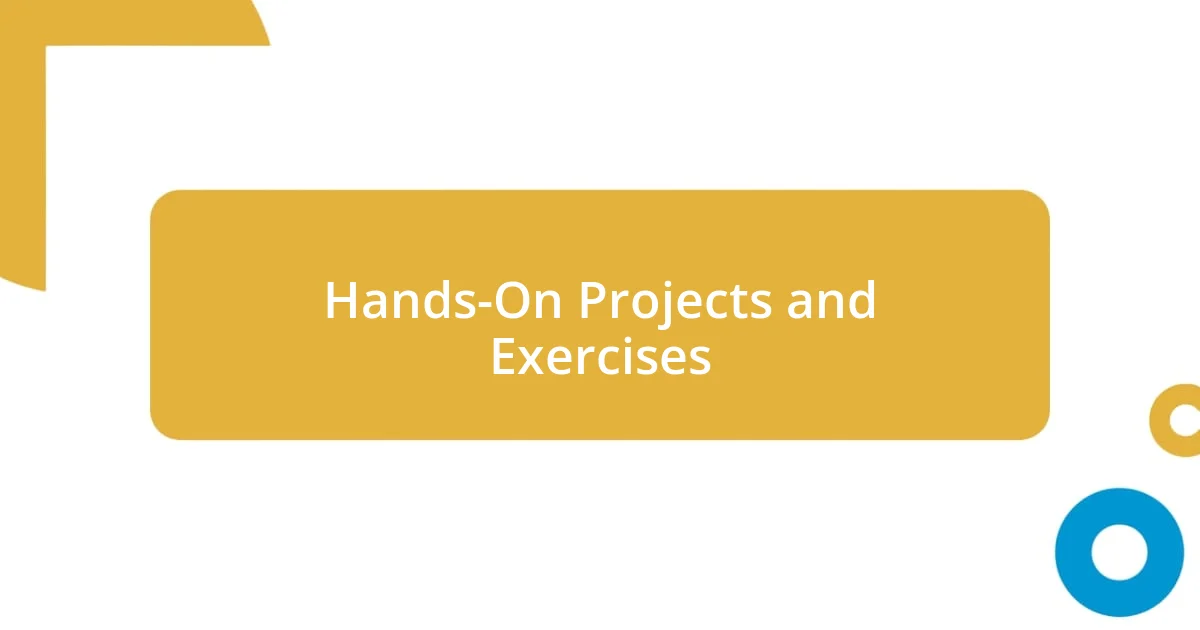
Hands-On Projects and Exercises
Hands-on projects were a game changer for my MySQL learning journey. I decided to create a small personal project where I could manage my book collection using a MySQL database. I’m not exaggerating when I say this practical experience was like a lightbulb moment. As I built out the database schema, wrote queries to sort my favorites, and even experimented with joins, the theoretical concepts began to solidify in my mind. Don’t you find it’s often that way? When you actively engage in a task, the learning feels less like a slog and more like an adventure.
I also explored various online challenges and exercises, which added another layer to my understanding. Websites like LeetCode and HackerRank offer practice problems tailored for SQL, and tackling these made me feel like a detective piecing together clues. I remember one specific challenge that required optimizing a slow query, and the satisfaction I felt after successfully improving its performance was immense. It was a real-world problem wrapped in a fun package, and discovering the solution made me realize just how empowering hands-on practice can be.
Lastly, I found it incredibly rewarding to collaborate on projects with other learners. We started a mini group project that involved developing a database for a fictional coffee shop. Working together helped me see different approaches to problem-solving and allowed me to ask questions without hesitation. That collaborative spirit transformed what could have been a solitary experience into a lively exploration, making me appreciate not only the technical skills I gained but also the friendships I developed along the way. How have you engaged with others in your learning process? It’s truly amazing what insights can emerge from a team effort.
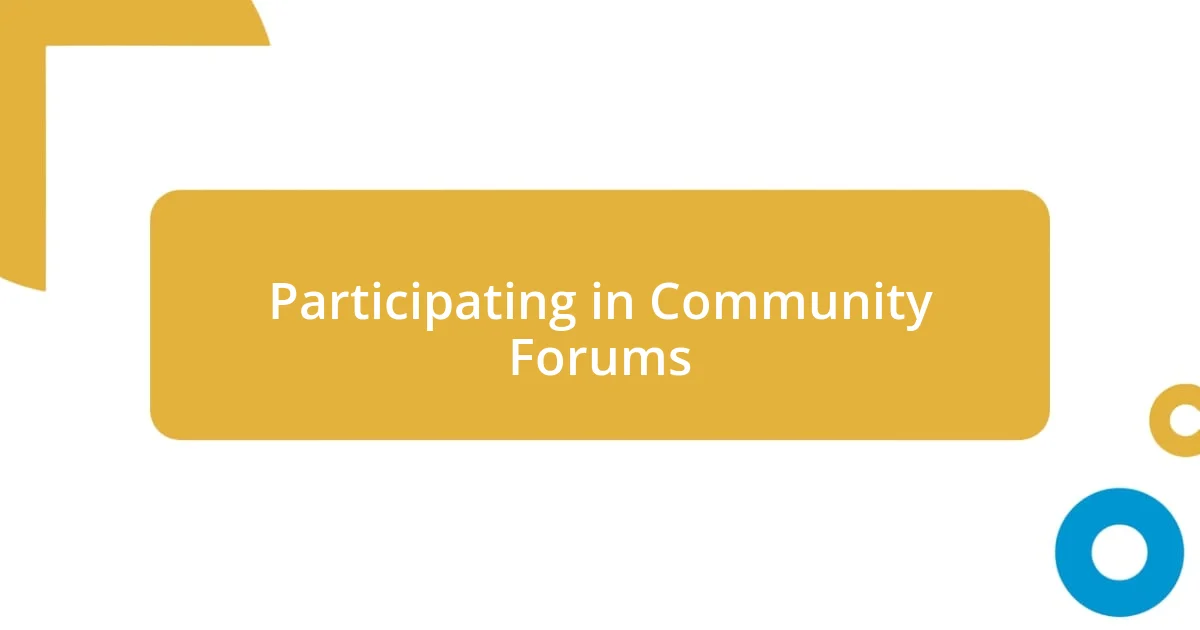
Participating in Community Forums
Participating in community forums was one of the most enlightening experiences on my MySQL journey. I remember the first time I posted a question in an online forum; my heart raced with excitement and nerves. The responses I received were invaluable. Not only did they present solutions, but they also opened my eyes to different perspectives on solving problems I hadn’t considered. The sense of community was surprisingly comforting—it’s like being part of a group where everyone shares a common goal: learning and improving together.
Engaging with others in these forums also pushed me to give back. After gaining confidence, I started answering questions or sharing my own experiences. I found that articulating my understanding not only reinforced my knowledge but also fostered deeper connections with fellow members. Have you ever noticed how teaching often solidifies your own understanding? That’s exactly what happened for me. The feedback I received was both encouraging and rewarding, reminding me that I wasn’t just learning in isolation; I was part of a living dialogue.
Additionally, forums became a place where I explored not only technical questions but also broader discussions about best practices and emerging trends in MySQL. There were moments when a simple thread on indexing opened up a new fascination for me; I realized how crucial it is for performance optimization. Participating in discussions like these ignited my curiosity and expanded my knowledge beyond the basics. It’s fascinating how a simple question can lead to a deeply enriching conversation. Have you ever discovered a passion just by engaging with others? That’s how I stumbled upon some of the advanced concepts that now feel integral to my MySQL skill set.
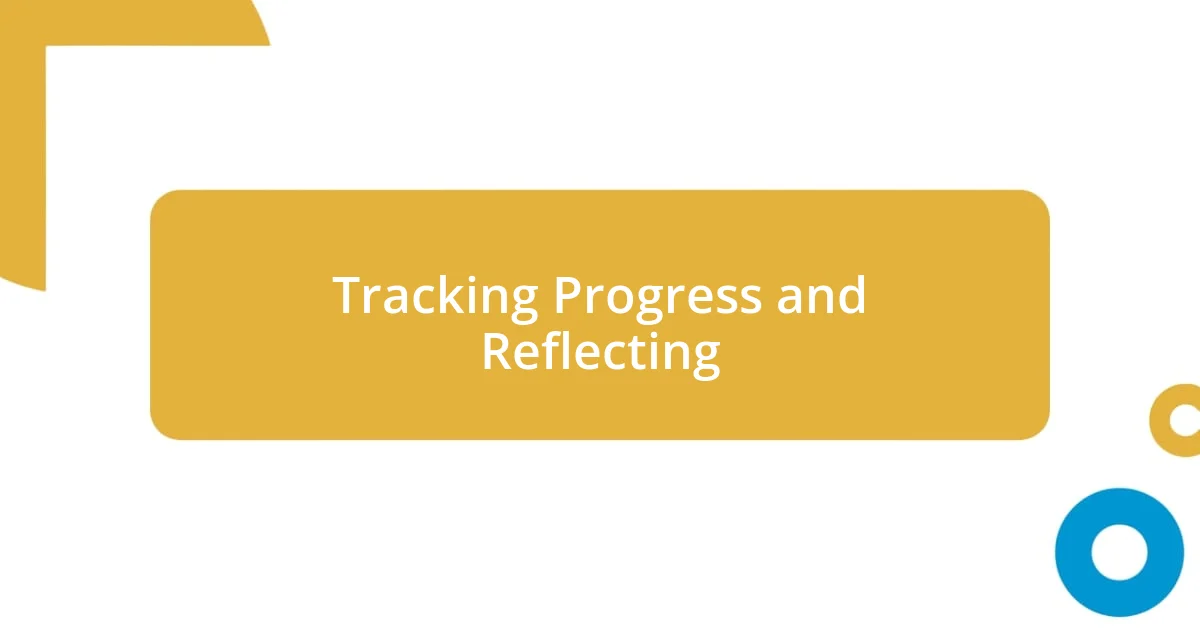
Tracking Progress and Reflecting
Tracking my progress with MySQL was essential for me. I started by maintaining a simple journal where I would jot down things like new concepts I learned or challenges I faced. This practice not only helped me see how far I had come but also pinpointed areas that needed more attention. I can’t stress enough how looking back on those reflections gave me a key sense of accomplishment, motivating me to keep pushing forward.
I sometimes set specific, achievable goals—like mastering a particular query type or completing a set number of online challenges within a month. The feeling of checking off these goals was incredibly satisfying, almost like crossing items off a treasure map. By tracking these milestones, I could visually witness my growth, which just reaffirmed my commitment to continuous learning. Have you ever found that tangible progress can be a huge motivator in your journey? I certainly did!
Reflecting on my learning journey was equally important. After each project or set of exercises, I would take a moment to evaluate what went well and what I could improve. This reflection is where I discovered some of the most valuable insights—like recognizing patterns in my mistakes or understanding what resources were most helpful. It’s funny how stepping back can illuminate things I might have missed in the heat of the moment. How often do we take that pause? Trust me, it can lead to breakthroughs just when you think you’ve hit a wall.
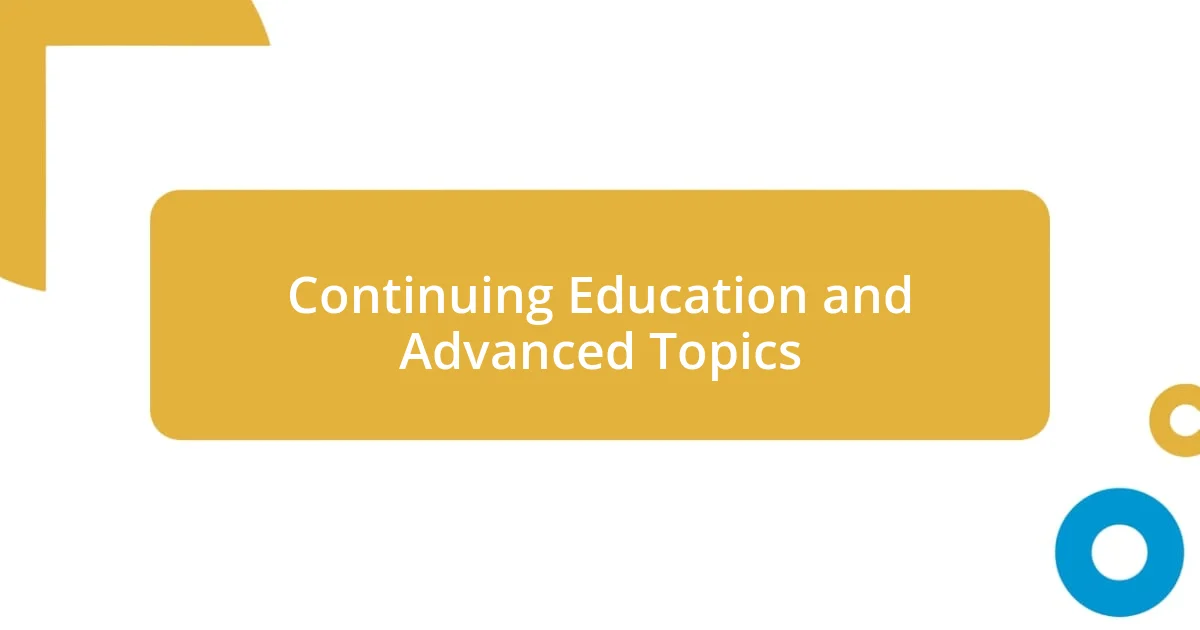
Continuing Education and Advanced Topics
Expanding my MySQL knowledge has been a journey of continuous education, and I’ve found that delving into advanced topics keeps the excitement alive. I still remember the first time I attended a workshop about query optimization techniques—it was like uncovering hidden treasures within my databases. The practical exercises we tackled provided insights that reshaped my approach to writing queries. Have you ever had a moment where everything clicked into place? That’s how I felt as I started applying those concepts to my own projects.
Moreover, I’ve embraced online courses that cover advanced topics like database design and performance tuning. Enrolling in these courses often feels like opening a door to a whole new world of possibilities. I distinctly recall the thrill of learning about indexing strategies—I never realized how an index could turn a sluggish query into a lightning-fast one. It was a game-changer! Have you experienced that rush of excitement when learning something that significantly enhances your work? Incorporating what I learned has continued to elevate my skills, allowing me to tackle more complex projects with confidence.
Networking with professionals in the field has also contributed to my ongoing education. Attending meetups and engaging in technical discussions has provided me with real-world perspectives I wouldn’t have gained from books alone. I vividly remember a conversation about the nuances of NoSQL versus SQL databases that changed how I view database architecture. Connecting with seasoned experts not only expanded my technical repertoire but also inspired me to think critically about my work. Isn’t it amazing how collaboration can spark new ideas? Engaging with others has truly been a pillar in my advanced learning, enriching my understanding well beyond the traditional classroom setting.
